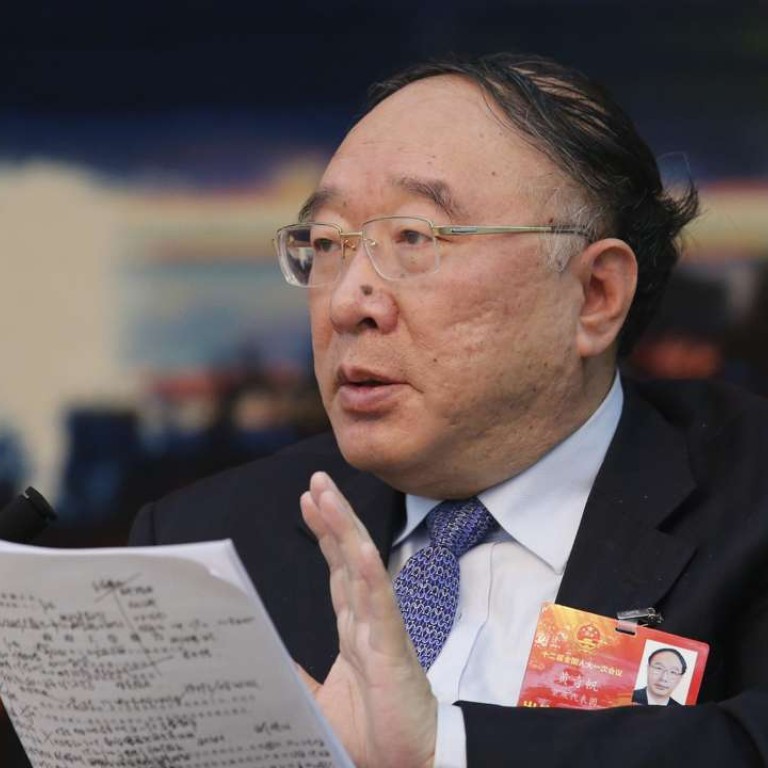
End of an era for mayor who survived Bo Xilai scandal and oversaw Chongqing’s economic boom
Huang Qifan was once tipped for high office, but he has quit as Chongqing’s mayor and sources suggest he may be heading for a relatively low-key post in the national legislature
For 15 years, Huang Qifan stood at or near the helm of Chongqing’s government, helping steer the megacity through the rapids of economic growth.
The agile technocrat was also a political survivor, riding out one of the country’s biggest political scandals in decades to be tipped for even higher office in the central government.
But that all changed yesterday with state media confirming a South China Morning Post report that Huang, 64, had stepped down as the municipality’s mayor. Sources told the Post that the former Communist Party rising star was expected to move to a relatively low-profile position on one of the sub committees under the National People’s Congress.
During time in Chongqing, Huang served with six party secretaries, including Bo Xilai, who was jailed for life three years ago for bribery, embezzlement and abuse of power.
Huang was known as the architect of economic growth in the “Chongqing model”, which highlighted state control of land and development projects. But the political side of the model under Bo’s tenure soon caused alarm among reformers in the central government, with its promotion of revolutionary songs harking back to the Mao Zedong era and a crackdown on crime.
Huang survived because he was not deeply involved in the political struggle and stuck mainly to economic affairs, Peng Peng, from the Guangzhou Academy of Social Sciences, said.
Li Wei, assistant political professor at the Chinese University of Hong Kong, said the party would not get rid of all cadres in one place, preferring to “team up with others if planning to remove an important political figure”.
Before Huang moved from Shanghai in 2001, Chongqing was an economic backwater surrounded by poor mountainous rural towns. Huang helped turn the city into a powerhouse with the country’s fastest growth rates over the past two years. In the first three quarters of this year, Chongqing again achieved the top growth rate of 10.7 per cent.
Zheng Xinli, a senior official with the top political consultative body, said Shanghai’s biggest contribution to Chongqing was sending Huang there.

Huang’s major achievements in Chongqing included developing an electronics industry to cut its reliance on coal and steel, keeping a lid on home prices and building cross-border rail links.
Huang once described his work relations with Bo as “fish and water”, but he managed to survive the fall of the former party chief.
He even gave evidence against his former boss in court, saying Bo’s proposal to remove the city’s police chief Wang Lijun was made without the approval of the Ministry of Public Security.
Ahead of Bo’s trial, Huang warned that the turmoil surrounding the corruption investigation was harming Chongqing’s ability to attract business and investment. But within months he said the government had managed to banish Bo’s legacy and city still managed to post strong economic figures in 2012.
Huang was also one of the few provincial leaders who regularly commented on decisions made by the nation’s financial authorities. He warned last year that the stock markets needed to be reformed or they would be “lost”.
Huang was also previously thought to be in President Xi Jinping’s favour, joining Xi’s delegation to the United States last year.
Xi also applauded Chongqing’s social and economic development during his visit to the metropolis at the start of this year.
Huang was born in Zhejiang province in 1952 and started work at 16 in a coking coal plant in Shanghai. He earned the chance to study at a mechanical college before returning to the plant as a technician and being promoted to deputy manager in 1983.
He went into politics the same year and joined Shanghai’s party committee, serving in various roles. His work in the country’s financial hub, much linked to the creation of the Pudong financial district, paved the way for his move to Chongqing.
